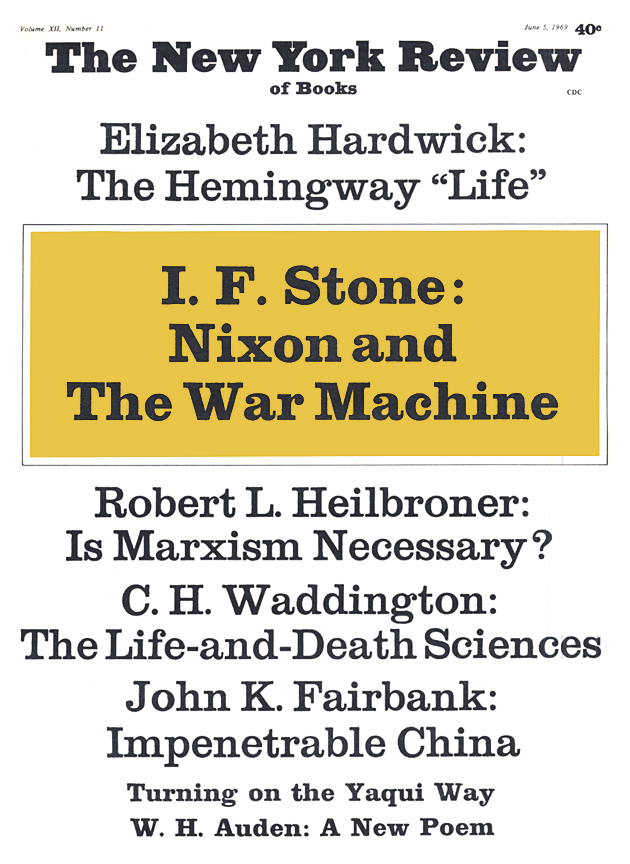To the Editors:
I have been sent a copy of a pamphlet, published by the Modern Language Association of America, called “Professional Standards and American Editions: A Response to Edmund Wilson.” I have already replied, in my own pamphlet, “The Fruits of the MLA,” to most of the complaints it contains. I find, however, that Mr. Oscar Cargill declares that I maintain, in Axel’s Castle, that T. S. Eliot borrowed from Blake his phrase in “Gerontion” “Christ the tiger.” Actually, neither in Axel’s Castle nor elsewhere have I discussed this phrase, and I have never supposed it was borrowed from Blake. “After all,” Mr. Cargill continues, “Eliot revolted against the Romantics, of whom Blake was one.” But how can Blake be called a Romantic? Certainly Eliot did not think he was. See his essay on Blake in The Sacred Wood, where he calls him “a poet of genius.”
This pamphlet leads off with a menacing statement by Mr. Gordon N. Ray:
“The recent attack in The New York Review of Books on the Center for Editions of American Authors of the Modern Language Association of America raises complex questions of taste and emphasis. It must be obvious at the same time, however, that this attack derives in part from the alarm of amateurs at seeing rigorous professional standards applied to a subject in which they have a vested interest. Here, at least, the issue is not in doubt. As the American learned world has come to full maturity since the second World War, a similar animus has shown itself and been discredited in field after field from botany to folklore. In the long run professional standards always prevail.”
I have had some respect for Mr. Ray on account of his edition of Thackeray’s letters—though I was slightly annoyed by his following Thackeray’s epistolary shorthand so pedantically as to print all his and’s as ampersands and his contractions of such common words as should and which, when a note of explanation or the facsimile of the page of a letter would have been enough to indicate this practice and leave the editor free to present a more readable text. But the statement above is absurd. In regard to scholarship of this kind, what is meant by “professional standards” which “in the long run…always prevail”? It is necessary to have a Bar Association to keep the legal profession in order and a Medical Association to prevent malpractice. But there is not and there is not needed any similar organization to protect the kind of literary scholarship to which I have been objecting. People like Mr. Ray try to behave as if there were, but I have been gratified to discover, from the approving letters I have received, that a great many academics, including a number of scholars who have proved their own competence, do not accept these policies and procedures. And, in this field, who are “the professionals”? The writers who produce the books or the non-writers who make it harder to read them? “A similar animus [to mine],” says Mr. Ray, “has shown itself and been discredited in field after field from botany to folklore.” What does he mean by this? Percy’s Reliques in which Bishop Percy allowed himself a pretty free hand in revising the text of his old English ballads, is a more valuable and more important book than F.J. Child’s enormous repository for which he took down and published so many inept and illiterate versions, so many tiresome repetitions of the same ballad. As for botany, I find it difficult to see what the analogy can be. Have the flowers been rebelling against classification? Or do they object to being picked and mounted, as our writers might well object to being trussed up and made inaccessible for CEAA editions?
Edmund Wilson
Wellfleet, Mass.
This Issue
June 5, 1969


